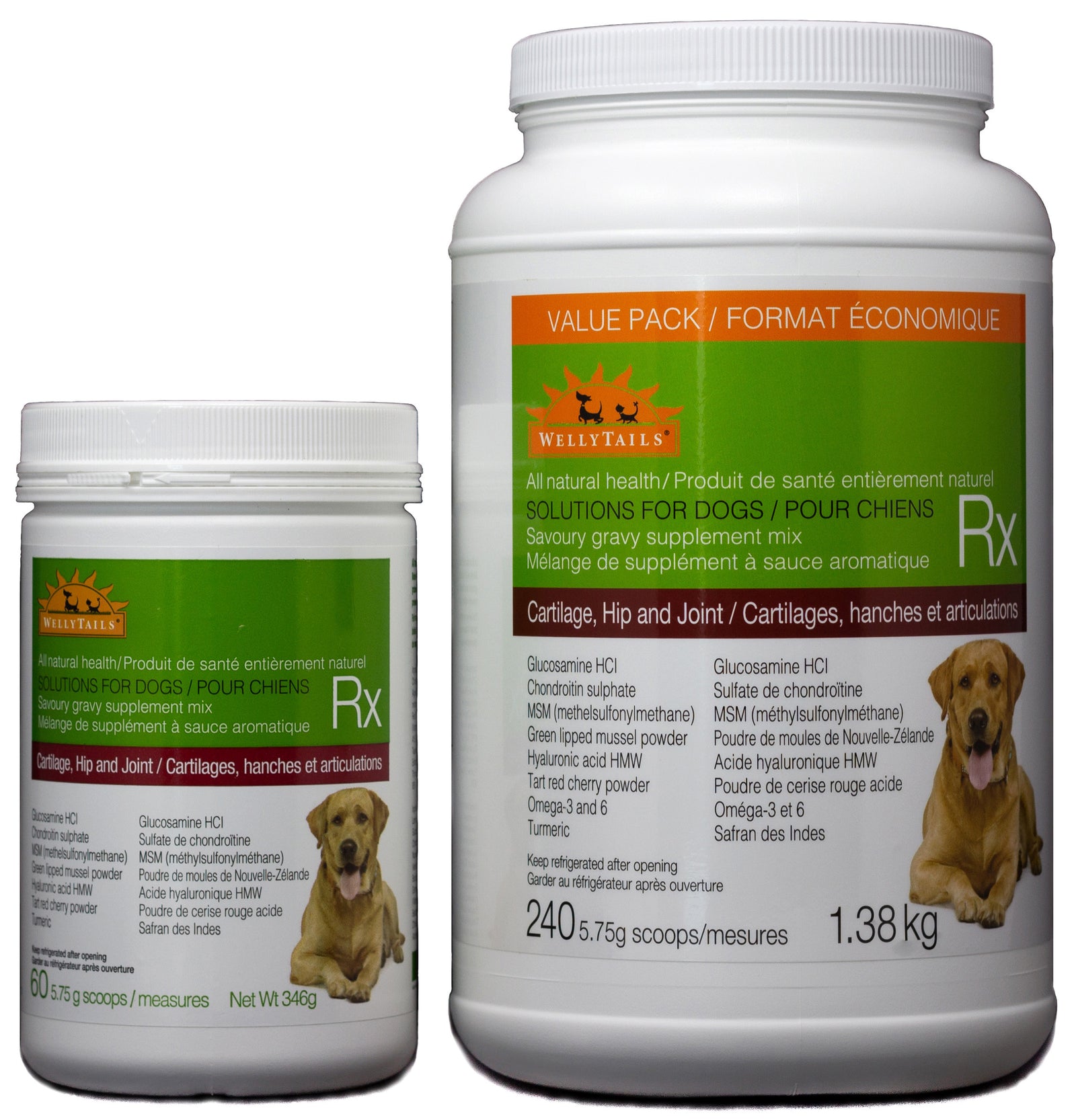Veterinary Treatment Options for Dogs with Arthritis
As dogs enter their senior years, activities that they once enjoyed now become an effort as they slow down, and their quality of life is adversely affected by the onslaught of age-related issues. Their aging bodies start to deteriorate, physically, mentally, and physiologically, from years of wear and tear. Thanks to the advancements in the better understanding of nutrition, veterinary medicine and companion animal care dogs are living longer into their senior ages. On the other side of the coin, longer longevity also means that dogs have increased odds of suffering from senior age-related issues like arthritis.
As dogs get older, the cartilage lining their joints often starts to thin. As the cells of the cartilage die, they release enzymes that trigger an inflammatory reaction inside the joint capsule. The inflammation can eventually lead to an excessive build-up of fluid causing swelling in the affected joint. This can also pave the way for the growth of osteophytes (bony growths) inside the joint, leading to the narrowing of the joint space. The cartilage of the bones making up the joint eventually can eventually degenerate and the bones can start to painfully rub together. The deteriorative changes taking place in the joint sets off a cascade of changes in the normal function of the joint coupled with a lot of pain, mobility problems, discomfort, loss of flexibility, and muscle atrophy.
There is no actual cure for arthritis. Once it has set in, no medication can stop or reverse its effects. Treatments are geared toward alleviating the symptoms, slowing down the deterioration, and improving the dog’s quality of life.
Veterinary Treatment Strategies for Managing Dog Arthritis
If your senior dog has been diagnosed with arthritis, you should work closely with your veterinarian in developing a plan that is tailored to address the specific issues affecting your dog. A good arthritis management scheme is multi-pronged. The following strategies are beneficial in senior dogs suffering from arthritis:
Home Changes to Help Them Be More Comfortable
Arthritic dogs benefit from well-padded bedding. This can also help prevent pressure-point calluses from developing. Place your dog’s bed in a part of the house where it is warm, cold or damp drafts can be cruel to arthritic dogs. Slippery surfaces like hardwood flooring and smooth ceramic tile should be covered with an area of non-skid backed carpeting flooring. A ramp to get on and off the couch or your bed, if they sleep in your bed, helping them to negotiate getting up and down can be very helpful.
Dog Massage
Massage can help promote blood flow to affected muscles helping to prevent them from atrophy. You can take your dog to a certified canine massage therapist who can administer the massage therapy and some therapist also have course that will teach you how to do it yourself so it’s properly done.
Soothing joints with warm compresses, taking extra care to avoid using excess heat that can cause injury, heat therapy helps to relieve muscle and joint stiffness and helps to warm up joints before activity.
Cold compresses can help to reduce inflammation, swelling, and pain related to arthritis and activity.
Alternating warm and coldtherapy: use heat therapy to warm up a joint(s) before the walk/exercise and to use cold therapy later after the walk/exercise.
Dog Joint Supplements or Nutraceuticals
There are many dog joint supplements available for cartilage and joint health. The most effective supplements contain varying combinations of the following chondroprotective (chondro=joints) ingredient substances to substantially help slow the progression of the disease:
- Glucosamine
- Chondroitin
- MSM (Methylsulfonylmethane)
- New Zealand Freeze Dried Green Lipped Mussel
- Hyaluronic Acid
The above proven effective chondroprotective ingredients are often formulated with complimentary anti-inflammatory reducing agents such as:
Omega-3 fatty acids (EPA and DHA) possess anti-inflammatory effects that can help dogs with arthritis. While premium-quality pet foods may contain some marine Omega-3 EPA and DHA essential fatty acids in their formulas, much higher amounts from fish oil supplements will be needed to be effective in helping alleviate dog arthritis symptoms.
Turmeric– is well known for its anti-inflammatory properties. The yellow colour of turmeric comes from the curcumin that it naturally contains. Curcumin is a very powerful anti-inflammatory providing very good pain relief.
LEVEL 3 Dog Joint Supplements are formulated for use when a dog has advanced or severe arthritis and joint pain
Examples of Level 3 Dog Joint Supplements are:
WellyTails® Cartilage Hip & Joint Dog Rx
WellyTails 7 Way Hip & Joint MAXIMUM
LEVEL 2Dog Joint Supplements are formulated for use when a dog has early stages of arthritis and occasional joint pain after exercise and for prevention in dog breeds that are very prone to suffer from arthritis such as
- German Shepherd
- Labs
- Dachshund
- Rottweiler
- Newfoundland
- Great Danes
- Saint Bernard
- Old English Sheep Dog
- Mastiff
- Golden Retriever
Examples of Level 2 Dog Joint Supplements are:
WellyTails® Senior Dog Care Rx
WellyTails® Dog Daily Joint & Wellbeing
WellyTails® 5 Way Hip & Joint MAINTENANCE
LEVEL 1 Dog Joint Supplements
Anti-Inflammatory Pain Relief ONLY of Joint Pains
WellyTails® Fortified Wild Ocean Blend Fish Oil Dog Rx
NOTE: Fish Oil provides many other very valuable pet health benefits:
- Skin & Coat
- Puppy Brain, Nerve & Eye Development
- Cognitive Protection of Older Dogs
- Immune Support
- Kidney Health
Daily Exercise
Daily exercise and physical activity appropriate for the dog’s age and health status are very important to maintain mobility. Exercise can also help with weight management, a factor that is critical for managing dog arthritis. Obesity places a lot of extra strain and wear and tear on the dog’s joints.
Swimming is a popular workout for dogs with arthritic joint pains because it does not exert unnecessary pressure or strain on the weight-bearing joints of the body. Other low-impact exercises include:
- Leash walking
- Mild controlled jogging
- Underwater treadmills
Complementary Dog Arthritis Therapies
Alternative treatment methods, such as acupuncture and the use of Chinese herb formulas have also shown success in helping alleviate the pain symptoms of arthritis in dogs.
Laser Therapy
This is a relatively new form of therapy for dog arthriti. It stimulates the flow of blood to affected tissues and helps to improve the symptoms.
Veterinary Rehabilitation
Professional veterinary rehabilitation is an excellent option for alleviating symptoms of moderate to severe cases of arthritis. Veterinary rehabilitation therapists apply manual therapy techniques, such as stretching, joint mobilization, massage, and passive range of motion (PROM) to help relieve pain and improve the function of the joints.
Veterinary Dog Arthritis Prescription Medications
There are several options when it comes to medications for arthritis in dogs. Your veterinarian will decide which ones will work best after giving your dog a thorough examination and some specific tests and procedures.
Adequan® Canine (polysulfated glycosaminoglycan) Injections
Adequan Canine is a chondroprotective agent which means it can help in cartilage repair while promoting cartilage health. It has long been considered by many veterinarians as the gold standard when it comes to treating degenerative joint diseases in dogs, including arthritis. The downside is that it can be very expensive.
Steroids
Steroids possess an anti-inflammatory effect. But these medications should only be used when prescribed by a vet because long-term use can lead to harmful side effects.
NSAIDs
Non-steroidal anti-inflammatory drugs (NSAID) are commonly used for alleviating arthritis symptoms in dogs. But like steroids, they should be used with extreme caution because their use has been associated with various potential side effects, some of which can be irreversible.
In some cases, there may be a need to combine non-NSAID medications with NSAIDs to achieve a more comprehensive relief from painful arthritis. Combining them also means that the doses of both drugs are lower since their actions are combined. This can significantly reduce the risk of potential side effects associated with either drug.
Arthritis, whether it’s age-related or not, can adversely affect the lives of affected dogs. As you can see, arthritis treatment in dogs is a multi-modal integrative approach aimed at maximizing the dog’s comfort and improving the animal’s quality of life.
Dog Arthritis Pain Management Alone is NOT a Good Therapy
- The human brain has a capacity that remembers that the body still DOES HAVE a joint problem when we take pain killer medications.
- A dog given a anti-inflammatory pain killer only supplement or veterinary prescribed medication NSAID pain killer feels no pain and just wants to run, jump and roughhouse and has no memory of a joint problem condition.
- THUS PAIN KILLERS ALONE ARE NOT A VERY GOOD STRATEGY AS THE DOG JUST KEEPS MAKING THE CONDITION WORSE AND WORSE!
- You want to provide pain relief and provenchondroprotective ingredients formulated to provider dosages of the clinical researched levels to slow down the progression of the arthritis in the dog.

